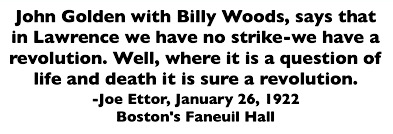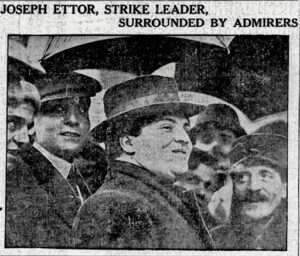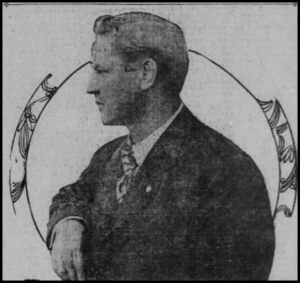 —————
—————
Hellraisers Journal – Monday January 29, 1912
Boston, Massachusetts – Joe Ettor Speaks on Behalf of Lawrence Strikers
From The Boston Daily Globe of January 27, 1912:
ETTOR SPEAKS IN FANEUIL HALL
———–
Joseph J. Ettor was the star of the great meeting in the interest of the Lawrence strikers which was held last evening in Faneuil Hail under the auspices of the socialist party of Boston. His picturesque looks and his vivid description of conditions in Lawrence contributed in part to the applause which greeted him.
This man differs in appearance from any labor leader that has ever been seen in this part of the world before. He has a face on him which at first impresses you as being feminine, but which becomes masculine and full of expression when he talks. His skin looks as soft as a girls and his eyes are as black as coals.
More than $200 was taken up in a collection for the benefit of the strikers. The hall was crowded, though not uncomfortably so, and the rather large force of policemen found nothing to do but listen. There was a band of music, which kept the crowd entertained until 8:20, when a great cheer went up as the red Socialist flag and the American flag were borne up the center aisle and behind them came Ettor, James P. Carey and a number of people who were to sit on the platform.
The meeting was called to order by George D. Hall, who said he had personally visited all the textile cities in New England and had found nowhere more miserable conditions than existed in Lawrence.
———-
Woman Striker Speaks.
Miss K. S. Hanscom, one of the Lawrence strikers, addressed an audience for the first time and found a little difficulty in expressing herself. But she was so deeply impressed with the thing she wanted to say that she found no difficulty in making herself understood. She wanted to express first her admiration for the courage of the poor people who went out on strike, but more especially for the Italian women who were the first to walk out of the Wood Worsted mill. The average wage of most of the men and women, she said, was $5 a week, and they were compelled to do three and four times more work than formerly. The weavers and spinner do not average $9 a week.
Chairman Hall announced that the Boston Socialist Club proposed through a committee of 300 to collect by means of a house-to-house campaign clothing and funds for the strikers.
———–
Ettor Speaks of Wood.
Joseph J. Ettor was loudly cheered when he was introduced and it took considerable protesting with his hand to stop the applause.
This evening I was an conference with Mr. William M. Wood and he assured me that while I represented 20,000 workers he had 14.000 investors. Some of them live on the Riviera. (Laughter).
[Continued Ettor with a laugh:]
That’s way off in Russia, I guess. You see the capitalist class know no East nor West, nor any other boundary.
The important thing today is that 20,000 mill workers of Lawrence are out on strike. The other side has done all in its power to crush out every effort that has been made by these people in the past to express themselves. The one who made a complaint was always made the victim of oppression by bosses and superintendents.
———-
Learn They Are Not Slaves.
An attempt is being made to bring the workers back to the mills, that they may be able to weave their lives into cloth on the old terms. John Golden with Billy Woods, say that in Lawrence we have no strike-we have a revolution. Well, where it is a question of life and death it is sure a revolution.
Twelve days ago the strikers were slaves, with nobody to speak for them-slaves attached to the looms who did not dare to raise their heads. All that has been changed in 12 days. These people have discovered that they are not slaves to superintendents or agents of mills.


